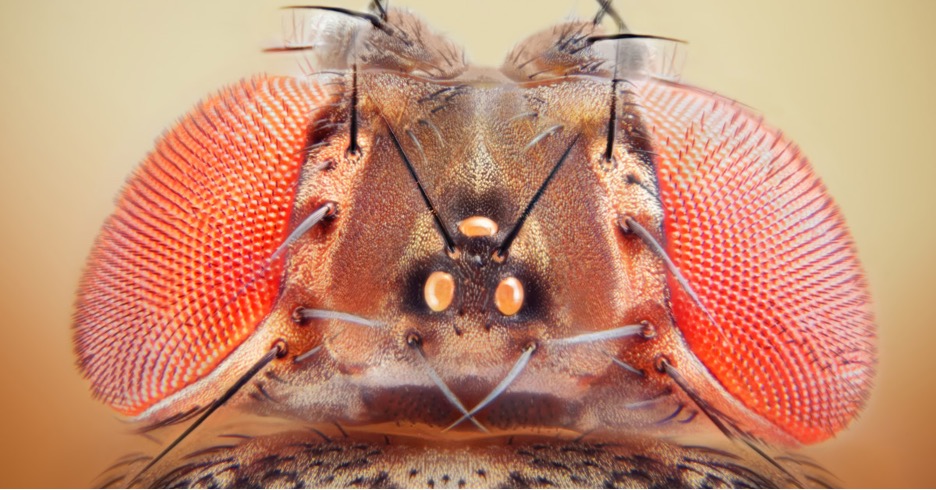Company genetically engineers fruit flies to be “biofactories” for fake meat production
Published: February 6, 2023
Category: GMO News

Future Fields’ EntoEngine insects have serious environmental and ethical downsides.
Report by Claire Robinson; technical advice by Dr. Michael Antoniou
The biotech company Future Fields has notified the Canadian authorities of its intention to commercialize EntoEngine, a genetically modified fly. The flies are engineered to produce foreign proteins—in this case, growth factors, which are cell signaling molecules that play important roles in cell proliferation and development, for use in what Future Fields calls “cellular agriculture”—what we call lab-grown or fake meat.
In our view, EntoEngine flies pose serious environmental risks in the likely event that they will escape contained conditions.
The details
The company says, “The EntoEngine fly line has been genetically engineered to express a growth factor isolated from cows…. The gene sequence poses no known risks to either humans or animals. Expression of the gene encoding the growth factor is under the control of a gene expression regulator isolated from yeast.”
Future Fields argues that the GM fly is needed to replace the usual way of producing growth factors—in bioreactors. The company confirms what GMWatch has long said—that bioreactor technology is expensive, resource- and energy-hungry, and produces vast quantities of problematic waste.
Patent
Future Fields describes the status of the patent on EntoEngine as “pending.” Our patent search on the Espacenet and USPTO databases only found one patent on a GM insect with Future Fields as an applicant. The patent, titled “Method for producing recombinant proteins in insects” describes the general concept patent but lacks the experimental data to prove that the system actually works.
Torturing fruit flies
Regarding the heat stress trigger, the patent describes a gruesome and torturous process of gradually getting the flies used to the higher temperature of the heat stressor so that they don’t die from the shock of a sudden rise, by applying the stressor interspersed with “rest” periods.
When the insects have exhausted their ability to produce growth factor, they are killed and “harvested,” in the words of the Future Fields patent, then ground up into a mass, and the desired protein is extracted and purified out.
Doubtful ethics
The company’s patent and publicity make a big deal out of the supposedly superior ethics of using fruit flies to manufacture growth factors for “cellular agriculture,” as opposed to extracting them from fetal bovine serum (FBS) taken “from fetuses of pregnant cows prior to slaughter.” The patent says that cattle-derived FBS gives rise to “ethical concerns regarding the production of cultured meat products.”
But the point on ethics is disingenuous and contradictory, as Future Fields itself justifies its GM flies approach as replacing growth factors produced in bioreactors and not as replacing FBS, because FBS is not used by the lab-grown meat industry.
Environmental risks
The main risk posed by the GM flies is environmental. The risk with GM flies is that they could escape and breed in the environment or cross-breed with natural flies, leading to the escape of growth factor-producing genes into wild populations.
Conclusion
Future Fields’ GM fly appears to be an invention of dubious utility that will do little to improve the sustainability of the environmental catastrophe-in-the-making that is lab-grown meat. It poses unacceptable environmental risks in the event of an escape and the ethics around the GM fly’s grim life and grimmer death are dubious, to say the least.
Source: GM Watch
To view source article, visit:
https://gmwatch.org/en/106-news/latest-news/20155-company-genetically-engineers-fruit-flies-to-be-biofactories-for-fake-meat-production
Organic & Non-GMO Insights, February 2023








